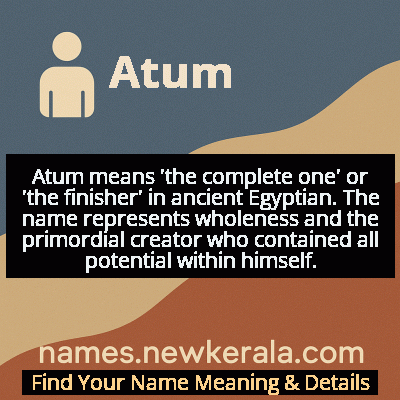Atum Name Meaning & Details
Origin, Popularity, Numerology Analysis & Name Meaning of Atum
Discover the origin, meaning, and cultural significance of the name ATUM. Delve into its historical roots and explore the lasting impact it has had on communities and traditions.
Name
Atum
Gender
Male
Origin
Egyptian
Lucky Number
1
Meaning of the Name - Atum
Atum means 'the complete one' or 'the finisher' in ancient Egyptian. The name represents wholeness and the primordial creator who contained all potential within himself.
Atum - Complete Numerology Analysis
Your Numerology Number
Based on Pythagorean Numerology System
Ruling Planet
Sun
Positive Nature
Leaders, ambitious, highly driven, self-reliant, innovative.
Negative Traits
Overly aggressive, domineering, impatient, selfish.
Lucky Colours
Red, orange, gold.
Lucky Days
Sunday.
Lucky Stones
Ruby, garnet.
Harmony Numbers
2, 3, 9.
Best Suited Professions
Entrepreneurs, managers, engineers.
What People Like About You
Courage, determination, leadership.
Famous People Named Atum
Atum (Mythological)
Egyptian God
Primordial creator deity who brought himself into existence and created the first gods
Atum the Priest
High Priest
Oversaw important religious ceremonies at Heliopolis during the New Kingdom
Atum of Memphis
Royal Scribe
Served as important administrative official under Pharaoh Amasis II
Name Variations & International Equivalents
Click on blue names to explore their detailed meanings. Gray names with will be available soon.
Cultural & Historical Significance
Over millennia, Atum's role evolved significantly, often merging with Ra as Atum-Ra to represent the setting sun—the completion of the solar cycle. This dual identity reinforced his association with endings, fulfillment, and the return to source. As a creator god who also represented completion, Atum embodied the entire cycle of existence from beginning to end. His imagery, typically showing him wearing the double crown of Egypt, symbolized his dominion over the unified kingdom and his role as the foundational power behind Egyptian kingship and cosmic order. The persistence of his worship across dynasties demonstrates his enduring importance in Egyptian spiritual life.
Extended Personality Analysis
Those named Atum often exhibit characteristics of completeness and self-sufficiency, reflecting their namesake's primordial nature. They tend to be natural leaders with strong creative impulses and the ability to initiate and complete projects successfully. Their personality typically combines wisdom with practicality, making them effective problem-solvers who can see matters through to their natural conclusion. Like the deity who created through self-generation, they often demonstrate remarkable independence and inner resources.
These individuals frequently possess a deep understanding of cycles and processes, enabling them to navigate complex situations with grace and foresight. They may be perceived as somewhat reserved or self-contained, yet they command respect through their competence and reliability. Their strength lies in their ability to bring wholeness to fragmented situations and to create stability where there was previously chaos. The dual nature of Atum as both beginning and end often manifests in their personality as an ability to both initiate new ventures and ensure their proper completion, making them valuable in leadership roles where both vision and execution are required.
Modern Usage & Popularity
In contemporary naming practices, Atum remains an uncommon but meaningful choice, primarily selected by parents with specific interests in Egyptian mythology or those seeking names with deep spiritual and historical resonance. The name sees occasional use in Egypt itself, particularly among families wishing to honor their ancient heritage, and has gained some traction in Western countries among enthusiasts of ancient cultures and alternative naming traditions. While it doesn't appear on mainstream popularity charts, it maintains a consistent presence in mythological and historical naming circles, often chosen for its powerful symbolism rather than current trends. The name's uniqueness appeals to modern parents looking for distinctive yet culturally rich names that stand out from more common choices while carrying substantial historical and spiritual weight.
Symbolic & Spiritual Meanings
Symbolically, Atum represents the concept of primordial wholeness and the completion of natural cycles. The name embodies the profound idea of self-creation emerging from chaos, symbolizing the moment of transition from potential to actual existence. As the deity of the evening sun, Atum represents the completion of the day's journey and the return to source, making the name symbolic of endings that inherently contain the seeds of new beginnings. The mythological act of creation through self-generation establishes Atum as a powerful symbol of self-sufficiency and the individual's capacity to manifest reality through will and intention. In broader philosophical terms, Atum represents the unity of opposites and the reconciliation of dualities, serving as an enduring symbol for the integrated self that contains all possibilities and contradictions within its unified nature.

